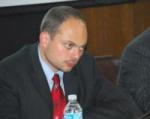Vladimir Kara Murza
http://www.worldaffairsjournal...Authoritarian regimes often hasten their end with their own arrogance and underestimation of opponents. Too often, they start believing their own propaganda. When, this past summer, the Russian authorities made the decision not to bar opposition leader Alexei Navalny from the Moscow mayoral election, the calculation was that he would receive a meager result, and the Kremlin would kill two birds with one stone—show that elections in Russia are “honest,” and that the opposition has “no support.” A July poll by the pro-Kremlin Public Opinion Foundation reported Navalny’s support in the Moscow election at 6 percent. Pro-Kremlin “analysts” confidently predicted that this figure was “the ceiling” for the opposition candidate.
But something went terribly wrong. Shut off from state-controlled television, faced with five criminal cases (in one of which he already received a five-year prison sentence), and subjected to a loud smear campaign, Navalny managed what the Russian opposition has long been accused of being unable to do—motivate thousands of supporters and volunteers, generate a genuine public enthusiasm for freedom and reform not seen in many years, and, in spite of all the obstacles, conduct a broad-based grassroots campaign with the central theme of “Change Russia—Begin with Moscow!”
Moscow has indeed begun to change Russia. According to the official results announced today by the Moscow City Electoral Commission, Navalny received 27.2 percent of the vote. A blogger with no government experience, no personal fortune, no financing from the “oligarchs,” no connections in high places, and no access to the mainstream media, has proved that, in the end, no amount of state pressure can overcome public desire for change.
From this moment, no one will be able to say that the opposition in Russia is a bunch of marginal nobodies and “agents of the US State Department,” with no public support to speak of. From this moment on, no one will be able to say that there is no electoral alternative to Vladimir Putin. And Putin will finally have to bring himself to pronounce the name of his main opponent.
But this is not the end of the story. According to the official numbers, the Kremlin’s candidate, incumbent Mayor Sergei Sobyanin, received 51.4 percent of the vote and was declared the winner. Given the authorities’ customary “vote-getting” techniques—including taking out mobile ballot boxes to elderly residents’ homes (outside the polling places where monitors are present), and reporting 80 percent of those votes for Sobyanin; and near-100 percent tallies for Sobyanin at psychiatric hospitals and old people’s homes, where residents are coerced into voting—it is evident that the Kremlin’s candidate did not cross the 50-percent threshold required for victory.
Furthermore, a parallel Moscow-wide vote count conducted by independent poll monitors (including Golos, Sonar, Citizen Observer, and other such groups) showed the actual result at 49.5 percent for Sobyanin and 28.6 percent for Navalny. Which means that there was no outright winner on September 8th, and that a runoff between the top two vote-getters must be held on September 22nd.
The opposing camps have taken their positions. After initially agreeing to talks with Navalny, Sobyanin withdrew the invitation. The regime is standing by its “first-round victory.” Navalny’s campaign is rejecting the official results and demanding a hand recount of the votes. On Monday evening, tens of thousands of Muscovites gathered on Bolotnaya Square to protest the stealing of their votes and call for a runoff. Addressing his supporters, Alexei Navalny vowed to continue the fight. The coming days may well decide Russia’s political future.
P.S. Not only Muscovites brought bad news for the Kremlin on September 8th. In Yaroslavl, opposition leader Boris Nemtsov was elected to the regional Parliament, despite censorship, administrative pressure during the campaign, and “carousel voting” on election day itself. In Yekaterinburg, Russia’s fourth-largest city, residents elected opposition candidate Yevgeny Roizman as their new mayor.
Vladimir Kara-Murza's blog

